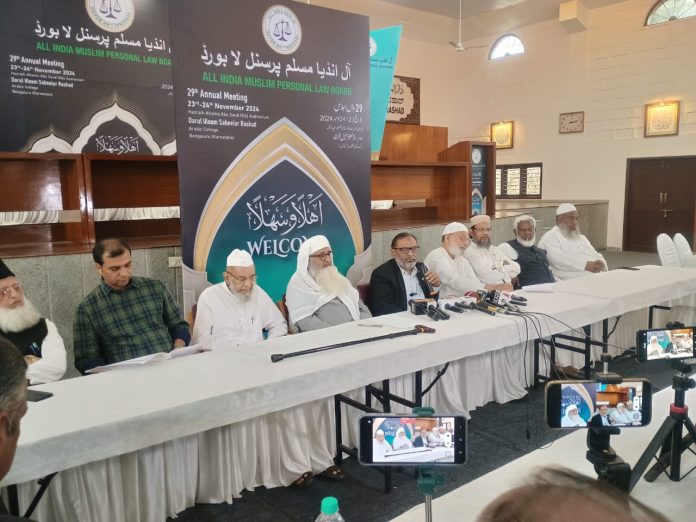– Pervez Bari
Bengaluru: The All India Muslim Personal Law Board (AIMPLB), during its 29th annual convention held on November 23–24, resolved to oppose the Waqf Amendment Bill 2024 in its entirety. Despite efforts to have the bill scrapped, the Board stated that if it is passed, it will exhaust all legal, constitutional, and democratic avenues to pressure the government to withdraw the amendments.
Dr. S.Q.R. Ilyas, AIMPLB spokesperson, and Maulana Fazlurrahim Mujaddidi, General Secretary, conveyed this stance during a press briefing on November 25, following the conclusion of the convention here. The event was hosted at Jamia Sabeelur Rashad and concluded late in the evening on November 24.
The Board expressed that the Bill is designed to undermine and usurp Waqf properties nationwide. It highlighted that the proposed 44 amendments aim to manipulate the legal and operational status of Waqf properties. Criticism was also directed at the Joint Parliamentary Committee (JPC), accusing it of partisanship and engaging with parties lacking a legitimate stake in the issue.
Dr. Ilyas stated that AIMPLB presented its objections to the JPC through a detailed study and mobilised approximately 3.66 crore Muslims to reject the Bill via a QR Code initiative. Including submissions from other Muslim groups, nearly 5 crore individuals opposed the Bill. The Board urged the government to recognise this substantial opposition in a democratic nation.
AIMPLB leaders also reached out to Opposition parties, including NDA allies, requesting their support in rejecting the Bill. Dr. Ilyas clarified that the Waqf Act does not grant special privileges, as similar powers exist for endowments of other communities.
The convention saw the re-election of Maulana Khalid Saifullah Rahmani as President for 2024-2026. The President-elect appointed office bearers, and vacancies in various categories were filled through elections.
Key Issues and Resolutions
- Uniform Civil Code (UCC)
The AIMPLB declared UCC unacceptable, arguing that it violates constitutional provisions ensuring religious freedom and cultural diversity. The Board emphasised that Shariah law, like the family laws of other communities, is rooted in religious traditions and protected under Article 25 of the Constitution. It termed the UCC as a threat to fundamental rights, federalism, and India’s unity in diversity. The Board announced plans to file a PIL in the Uttarakhand High Court challenging its UCC implementation.
- Places of Worship Act, 1991
The Board condemned increasing litigation targeting historical places of worship, such as the Gyanvapi Masjid in Varanasi and Shahi Idgah in Mathura. It criticised the Supreme Court’s interpretation that permits the re-examination of religious character, undermining the Act’s intent to preserve communal harmony. The Board warned that failure to restore the Act’s provisions could lead to widespread unrest.
- Humanitarian Crisis in Palestine
AIMPLB expressed shock over the ongoing violence in Gaza, describing it as genocide by Israel. It condemned the killing of over 45,000 people, predominantly women and children, and the displacement of millions. The Board criticised India’s muted response and called for an end to Israel’s actions, urging global intervention to halt the humanitarian crisis.
- Protection against Blasphemy
The Board decried frequent derogatory remarks against Prophet Muhammad ﷺ in India, demanding strict legal action against offenders. It also called for the introduction of a blasphemy law to protect all religious figures from insult, regardless of faith.
Prophet Muhammad ﷺ is a very respectful personality. “We demand the Government of India must take stern actions against such miscreants and give them exemplary punishment. We also demand that the government must introduce Blasphemy legislation in Parliament banning insult to all religious and sacred personalities irrespective of their religion.”




